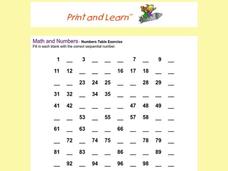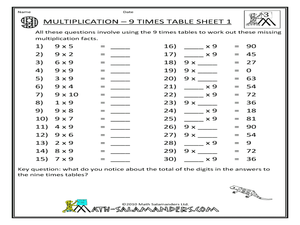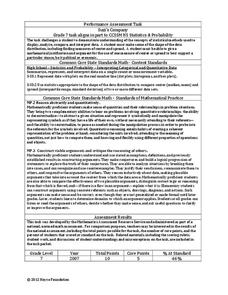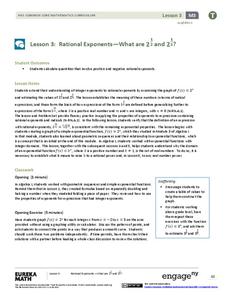Achieve
Ground Beef
Ever wonder how a butcher creates the different types of ground beef? Young mathematicians explore the methods butchers use to create their desired ground beef quality. Given a combination of two types of meat with varying...
Virginia Department of Education
Properties of Quadrilaterals
What type of quadrilateral is that? Discover the difference between the types of quadrilaterals. Small groups investigate types of quadrilaterals using geometry software to find their properties. To keep track of the different...
abcteach
Learning Number Words in Spanish
Combine Spanish vocabulary with a little bit of math. Learners practice the numbers one through twelve in Spanish by completing the sentences on the page. Various other vocabulary words are included in each sentence.
Curated OER
Using Random Sampling to Draw Inferences
Emerging statisticians develop the ability to make inferences from sample data while also working on proportional relationships in general. Here, young learners examine samples for bias, and then use random samples to make...
Curated OER
6, 7, 8, 9 and 10 Times Table Speed Test
For this multiplication grid worksheet, students practice multiplication by 6, 7, 8, 9, or 10. Students are timed in filling out a multiplication table grid.
Curated OER
Learning the Anti-differentiation Process
In this math worksheet, students examine the data table and attempt to fill in the empty boxes for the functions. They are asked to list the pattern found there.
Curated OER
2 Times Table
In this multiplication worksheet, students learn about the 2 times table. They read the multiplication problems and practice saying them out loud. Students then complete the 20 multiplication problems in the packet. The answers are on...
Curated OER
4 Times Table
In this multiplication worksheet, students read and learn about the 4 times table. They then solve 20 multiplication problems in which they multiply 4 by a single digit number. The answers are on the last page.
Curated OER
3 Times Table
In this multiplication worksheet, learners learn about the 3 times table. They read the multiplication problems and practice saying them out loud. Students then complete the 20 multiplication problems in the packet. The answers are on...
Curated OER
9 Times Table
In this 9 times table worksheet, students learn the entire 9 multiplication table. They then solve 20 multiplication problems in which the multiply 9 by a single-digit number. The answers are on the last page.
Curated OER
Math and Numbers - Multiplication Table Exercise
In this multiplication table activity, students fill in each blank in the table with the correct product. All of the numbers are between 0 and 10. The activity has 100 blanks to fill in.
Curated OER
Numbers Table Exercise
In this numbers table worksheet, students practice filling in each blank with the correct sequential number in a list going from one to one hundred.
Math Salamanders Ltd.
Multiplication - Nine Times Table Sheet 1
In this multiplication-nine times table learning exercise, students use the 9 times table to work out the missing multiplication facts in 30 problems, then observe a pattern in the total of the digits.
Inside Mathematics
Suzi's Company
The mean might not always be the best representation of the average. The assessment task has individuals determine the measures of center for the salaries of a company. They determine which of the three would be the best representation...
Curated OER
Get a Half Life!: Student Worksheet
Upper elementary or middle schoolers will explore non-linear functions, graphing, and the curve of best fit through real-life data collection and trial analysis. They explore the concept of half-life and radioactive decay using M&Ms,...
Curated OER
Multiples of 6 #2
Count by six with these helpful activities. After completing number sequences and multiplication problems from the six times table, third graders solve problems that are written out at the bottom of the page. An excellent way to work on...
EngageNY
Tax, Commissions, Fees, and Other Real-World Percent Problems
Pupils work several real-world problems that use percents in the 11th portion of a 20-part series. The problems contain percents involved with taxes, commissions, discounts, tips, fees, and interest. Scholars use the equations formed for...
Illustrative Mathematics
How Many Colored Pencils?
Support young mathematicians' interpretation of place value in order to multiply single-digit numbers by 10. The task builds upon and enhances a learners' understanding of place value, a second grade skill, while introducing...
EngageNY
The Most Important Property of Logarithms
Won't the other properties be sad to learn that they're not the most important? The 11th installment of a 35-part module is essentially a continuation of the previous lesson, using logarithm tables to develop properties. Scholars...
Curated OER
Shaquille O'Neal Hand/Foot Span: Student Worksheet
Here's a clever math worksheet that has learners measure their hand span, foot length, come up with a ration, then use that information to figure out the hand span, and foot length of basketball giant Shaquille O'Neal. A good activity!
Curated OER
Days and Seasons
Introduce young scholars to calendars as they practice the days of the week and four seasons. First graders complete three days-of-the-week sequences, each starting on a different day. They can reference the completed sequence example...
EngageNY
Rational Exponents—What are 2^1/2 and 2^1/3?
Are you rooting for your high schoolers to learn about rational exponents? In the third installment of a 35-part module, pupils first learn the meaning of 2^(1/n) by estimating values on the graph of y = 2^x and by using algebraic...
Illustrative Mathematics
The Djinni’s Offer
The djinni in this resource offers gold coins. Learners use the properties of exponents to make their decision as one offer increases exponentially. This makes a great group project. As the commentary suggests, start by having groups...
West Contra Costa Unified School District
Graph Square Root and Cube Root Functions
Scholars first learn to graph square root and cube root functions by creating a table of values. They then learn how to graph functions from transformation of the graphs of the parent square root and cube root functions.























